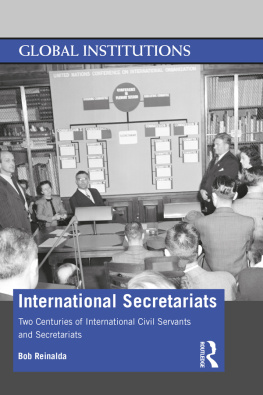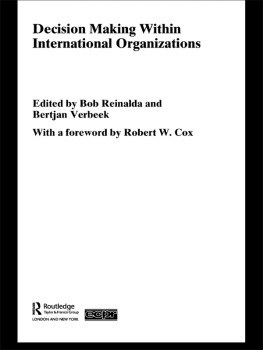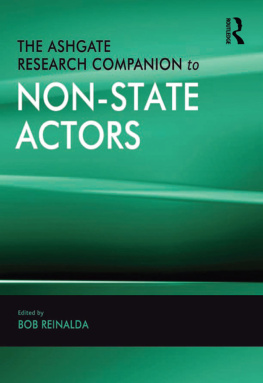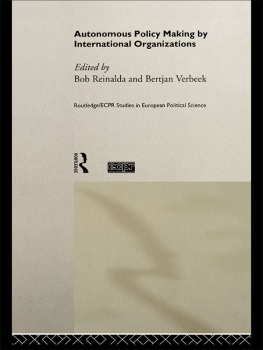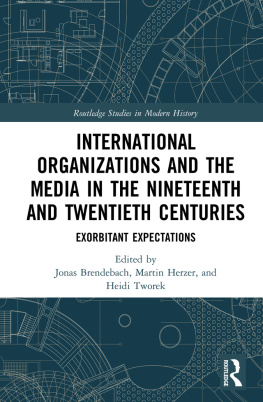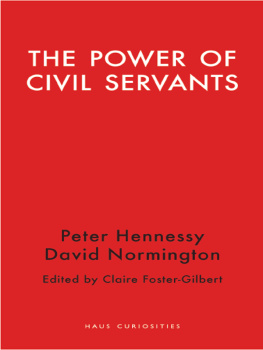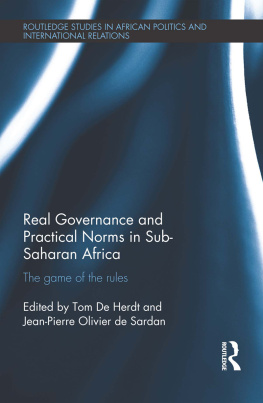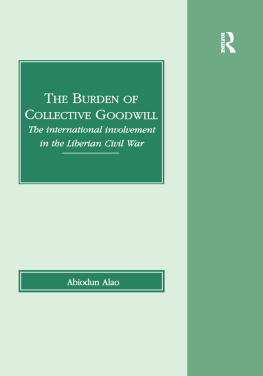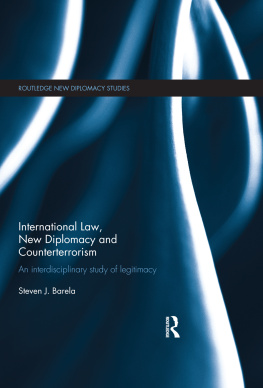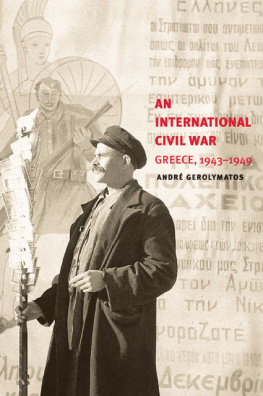INTERNATIONAL SECRETARIATS
Providing a comprehensive overview of two centuries of international civil servants and international secretariats, this book reveals how international secretariats have emerged and evolved, focusing on both structures (international public administrations) and the practitioners (international civil servants).
Reinalda explores the history and development of international secretariats and international civil servants, starting with the Congress of Vienna (18141815), when the first international organization was established in the form of a river commission for the navigation of the Rhine. Charting the development of international secretariats through the nineteenth century the League of Nations, the United Nations, and the United Nations System with its many specialized agencies, the author explains why NATO (North Atlantic Treaty Organization) and the OECD (Organisation for Economic Co-operation and Development) have strong, rather than weak, international secretariats, and shines a light on the registries of international courts and tribunals.
The book fills a gap in the literature by exploring the full evolution of international secretariats, covering global and continental developments as well as regional integration practices around the world. Secretariats have become the leading actors in multilateral diplomacy particularly for dealing with complex issues, and this book will be of interest to all scholars of global governance and practitioners working for a range of international organizations.
Bob Reinalda is a Fellow at the Department of Political Science, Radboud University, Nijmegen, The Netherlands. He published the Routledge History of International Organizations: From 1815 to the Present Day (2009) and edited the Ashgate Research Companion to Non-State Actors (2011), as well as the Routledge Handbook of International Organization (2013). Alongside Kent J. Kille and Jaci L. Eisenberg, he is an editor of IO BIO, the Biographical Dictionary of Secretaries-General of International Organizations: www.ru.nl/fm/iobio.
Routledge Global Institutions Series
Edited by Thomas G. Weiss
The CUNY Graduate Center, New York, USA
and Rorden Wilkinson
University of Sussex, Brighton, UK
About the series
The Global Institutions Series provides cutting-edge books about many aspects of what we know as global governance. It emerges from our shared frustrations with the state of available knowledgeelectronic and print-wisefor research and teaching. The series is designed as a resource for those interested in exploring issues of international organization and global governance. And since the first volumes appeared in 2005, we have taken significant strides toward filling many conceptual gaps.
The series consists of two related streams, distinguished by their blue and red covers. The blue volumes, comprising the majority of the books in the series, provide user-friendly and short (usually no more than 50,000 words) but authoritative guides to major global and regional organizations, as well as key issues in the global governance of security, the environment, human rights, poverty, and humanitarian action, among others. The books with red covers are designed to present original research and serve as extended and more specialized treatments of issues pertinent for advancing understanding about global governance.
The books in each of the streams are written by experts in the field, ranging from the most senior and respected authors to first-rate scholars at the beginning of their careers. In combination, the components of the series serve as key resources for faculty, students, and practitioners alike. The works in the blue stream have value as core and complementary readings in courses on, among other things, international organization, global governance, international law, international relations, and international political economy; the red volumes allow further reflection and investigation in these and related areas.
The books in the series also provide a segue to the foundation volume that offers the most comprehensive textbook treatment available, dealing with all the major issues, approaches, institutions, and actors in contemporary global governance. The second edition of our edited work International Organization and Global Governance (2018) contains chapters by many of the authors in the series.
Understanding global governancepast, present, and futureis far from a finished journey. The books in this series nonetheless represent significant steps toward a better way of conceiving contemporary problems and issues as well as, hopefully, doing something to improve world order. We value the feedback from our readers and their role in helping shape the ongoing development of the series.
A complete list of titles can be viewed online here: www.routledge.com/Global-Institutions/book-series/GI.
Sovereign Rules and the Politics of International Economic Law (2018)
Marc D. Froese
The Use of Force in UN Peacekeeping (2018)
edited by Peter Nadin
Human Rights and Conflict Resolution (2018)
edited by Claudia Fuentes Julio and Paula Drumond
Global Trends and Transitions in Security Expertise (2018)
James G. McGann
UNHCR as a Surrogate State (2018)
Sarah Deardorff Miller
The British Media and the Rwandan Genocide (2018)
John Nathaniel Clarke
The League of Nations (2018)
M. Patrick Cottrell
Global Governance and China (2018)
edited by Scott Kennedy
Global Business Associations (2019)
Karsten Ronit
A League of Democracies (2019)
Cosmopolitanism, Consolidation Arguments, and Global Public Goods
John Davenport
Moral Obligations and Sovereignty in International Relations (2019)
A Genealogy of Humanitarianism
Andrea Paras
Protecting the Internally Displaced (2019)
Rhetoric and Reality
Phil Orchard
Accessing and Implementing Human Rights and Justice (2019)
Kurt Mills and Melissa Labonte
The IMF, the WTO&the Politics of Economic Surveillance (2019)
Martin Edwards
Multinational Rapid Response Mechanisms (2019)
John Karlsrud and Yf Rykers
Towards a Global Consensus Against Corruption (2019)
International Agreements as Products of Diffusion and Signals of Commitment
Mathis Lohaus
Negotiating Trade in Uncertain Worlds (2019)
Misperception and Contestation in EU-West Africa Relations
Clara Weinhardt
Negotiations in the World Trade Organization (2019)
Design and Performance
Michal Parizek
The International Organization for Migration (2020)
Challenges, Commitments, Complexities
Megan Bradley
Humanitarian Negotiations with Armed Groups (2020)
The Frontlines of Diplomacy
Jonathan Ashley Clements
Diaspora Organizations in International Affairs

